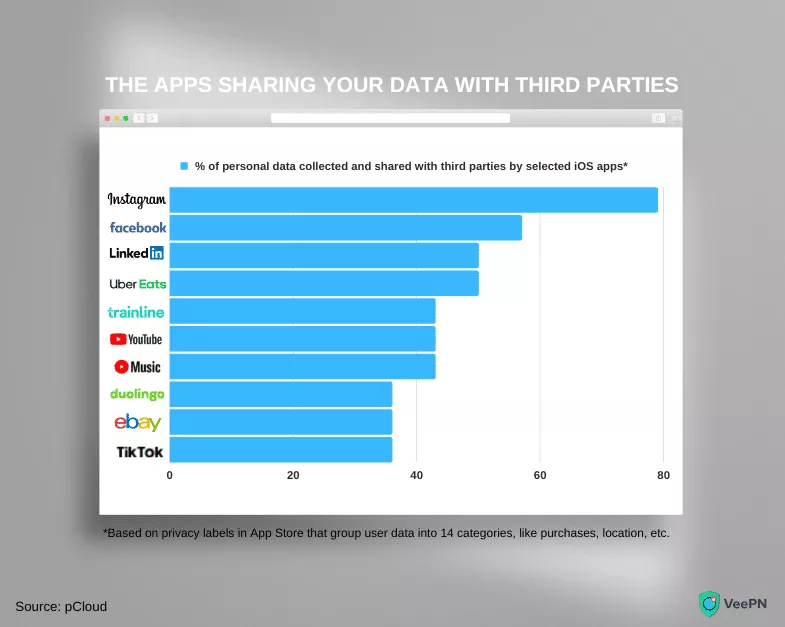The 10 Worst Apps for Privacy Concerns
We’ve all seen it — you finish browsing on one app, then see an ad selling something you’ve just looked at. Magic? No, ad targeting. While convenient, it also raises questions as to what extent apps’ invasion of our data can go — some nosy apps may know all there is to know about you. So, let’s see who a real tattletale is and what you can do to stay safe.

Worst privacy apps: Top offenders
Who knows best about our wrongdoers? Research! Experts at Swiss cloud storage service pCloud did a study on the most invasive iOS apps. pCloud assessed this invasiveness using the “privacy labels” added to Apple’s App Store. Divided into 14 categories, the labels show how an app will use your personal data, such as tracking your location, contacts, browsing history, and more. The study looked into which apps share the most user data with third parties. Here’s what came out:

But let’s zoom in and look at each app, including both paid and free apps that may pose serious privacy risks.
When it comes to selling your info, Instagram gets all the credit. It gives away a staggering 79% of your data, including purchasing information, personal data, and browsing history. This is to share promoted content. Why is it worrying then? Well, Instagram has over 1 billion monthly active users, who are most likely unaware of sharing such a high amount of their data. So, the number of affected users is high, to say the least.
Surprised Facebook made the list? Yeah, not really. With 57%, Facebook collects different kinds of data about your device and what you do on it, even if you’re not using the app at the moment. All to bombard you with targeted ads. Facebook requires almost every permission, like your contacts, call logs, text messages, Wi-Fi, location, and so on. It knows when you log in and how long you are in the app and tracks where you go, what you buy, what you browse. The company was also involved in numerous user data breaches, making user privacy one of the biggest concerns when dealing with Facebook.
This business-oriented online service sells off 50% of your data. This includes your purchases, location, contact info, user content, search history, and usage data.
Uber Eats
Food apps are convenient for ordering a favorite meal straight to your door. But some apps, like Uber Eats, also conveniently misuse your data. Uber Eats collects users’ location data, the pages users view in the app, and the times and dates they access it. The app shares it with services like LinkedIn, Indeed, Facebook, Adobe, and others.
Trainline
Even a ticketing app got here. Trainline collects 43% of your personal data, like purchases, location, contact info, search history, and usage data.
YouTube and YouTube Music
Stream YouTube often? Note that each time you look up a video there, the app sends 43% of your personal info elsewhere. This data travels to determine what ads you’ll see before and during videos. It’s also sold to brands who target you on other platforms. The same goes for YouTube’s music streaming counterpart, YouTube Music — the platform shares the same 43% of user data.
Duolingo
Giving away 36% of user info, this language-learning app collects your purchases, location, identifiers, usage data, and other data. Duolingo’s terms say the company shares this data with third-party ad networks, marketing analytics service providers and website analysis firms, like Google, Facebook Messenger, Oath, and Unity.
eBay
Based on how much data each app tracks overall, this online marketplace with 25 million users does quite “well.” It tracks and sells 40% of the personal data possible. GMA Investigates has also found some time ago that any bidder on an item can ask and get personal info of a seller in just a few seconds, like their full name, city and state of residence, and phone number. But this issue initiated the change in the company’s policy.
TikTok
At some point, China-based video-sharing app TikTok became a focus of concern among privacy-conscious users. The app has already been issued fines because they’ve collected personal info of children under 13 without getting parental consent. And the biggest concern is that children make up a large part of TikTok’s user base.
Unsafe apps: Who else to look out for
Of course there’s more to invasive apps than the pCloud study. Here are more common examples of apps that threaten your privacy.
Weather apps
You check the weather a few times a week, spending a couple of seconds in the app. Sounds innocent enough. But…as it turns out, weather apps are bad guys when it comes to online security. Once you grant permission, these services track your location 24/7 and sell your data to marketers. For example, here’s what the popular app Weatherbug says it collects:
Information that identifies specifically who you are, such as your name, email address, or mailing address…or other information such as Zip code, gender, date of birth and your interests.
The best way to avoid data breaches is to adjust your settings on these apps so that they won’t track your location when you’re not using them. You can also select your location and check the weather on a browser.
Google Maps
Most people can’t do without Google Maps. And we get it. But when you’re signed in, Google has everything laid out about you: location, where you’re headed (if you use it for directions), browsing history, which apps you use on your phone, and plenty of other personal information. So, does it know everything? Pretty much.
Any popular multiplayer game
Playing games with your friends may not seem so fun anymore. Popular games like “Words With Friends” have already made headlines in the past for data breaches — one case saw information theft from more than 200 million player accounts, including names, email addresses, login IDs, and more. Besides, Zynga, the “Words With Friends” creator, stores all kinds of user data, basically, any publicly available info they can find. Note that if a game is free, it makes profit by showing targeted ads to you, which usually involves data collection and sharing with marketers. And this requires collecting information about you.
Siri
Siri is your iPhone fairy. Ask her to call your friend. Or set reminders. Or to respond to a text. She’ll do it in no time. But here’s the thing. It was revealed earlier that Apple contractors can listen to confidential info on Siri recordings. So, she can do and know everything.
Bottom line: What are the most intrusive apps and what to do about it?
So, what do we have? Some of your most favorite apps, like Instagram, YouTube, TikTok, and even online games from the same company that makes popular social platforms, are quite the intruders and tattletales. Most of us can’t let a day go by without being on the phone. Does it mean all hope is lost when it comes to keeping your personal info safe? Not quite. Let’s see what you can do about it.
How to stay safe on the Internet
Total online privacy is a myth today. Sadly. You can’t keep all of your data under wraps at all times. But you can improve your digital security. How? Stick to the following points.
- Pay attention while giving permissions. When you open an app for the first time, it asks you for permissions. You can grant, deny, or allow them while using the app. Go for the third option if you don’t want to be tracked outside the app. You can also go to the Settings and see (and change) what permissions your apps have.
- Check reviews. Not sure what the app you want to download is about? Go through different customer reviews to see if you can trust the app with your private data. Also, not to waste much time, check out our list of most secure messaging apps and get yourself the most appealing option.
- Regularly update your software. Updates can fix many security vulnerabilities. So pay attention to whether it’s time to renew your apps.
- Use a reliable VPN. A VPN encrypts all traffic online. And this includes each and every one of your apps. Set up VeePN on your Android or iOS device and prevent third parties from spying on your Internet activity. And getting their hands on your data. Few minutes setup — longtime protection.
FAQ: Worst apps for privacy
Many of the apps you’re most likely using are not safe when it comes to your personal data. Apps like Instagram, YouTube, TikTok, eBay, and more, collect and share a nice chunk of your private info with third parties. Mostly for marketing purposes. Learn more in this article.
VeePN is freedom
Download VeePN Client for All Platforms
Enjoy a smooth VPN experience anywhere, anytime. No matter the device you have — phone or laptop, tablet or router — VeePN’s next-gen data protection and ultra-fast speeds will cover all of them.
Download for PC Download for Mac IOS and Android App
IOS and Android App
Want secure browsing while reading this?
See the difference for yourself - Try VeePN PRO for 3-days for $1, no risk, no pressure.
Start My $1 TrialThen VeePN PRO 1-year plan








